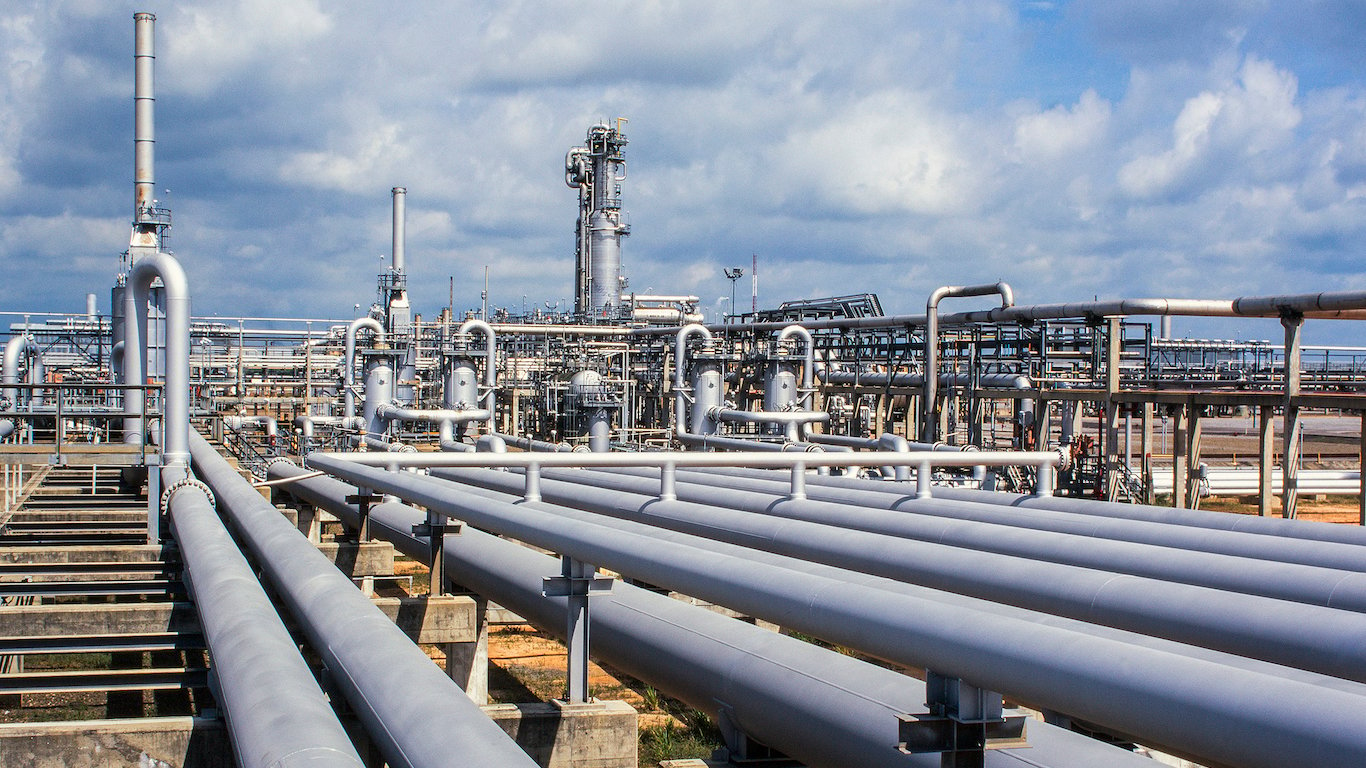Energy
Chesapeake Upbeat on Earnings, Investors Not So Much

Published:
Last Updated:

Chesapeake Energy Corp. (NYSE: CHK) reported second-quarter 2018 results before markets opened Wednesday. The oil and gas exploration and production company posted adjusted earnings per share (EPS) of $0.15 on revenues of $2.26 billion. In the same period a year ago, the company reported adjusted EPS of $0.18 on revenues of $2.28 billion. Second-quarter results also compare to consensus estimates for EPS of $0.15 and $2.28 billion in revenues.
The company’s total revenues from oil, natural gas and natural gas liquid (NGL) sales were down 23%. Average daily production rose slightly from 528,000 barrels of oil equivalent per day in the second quarter of 2017 to 530,000 barrels this year.
The average realized price per barrel of oil rose from $51.65 last year to $57.16, and the price per thousand cubic feet of natural gas dipped from $2.71 to $2.64. On an oil-equivalent barrel basis, the average production expense slipped from $2.92 to $2.86. Gathering, processing and transportation costs dropped from $7.44 per oil-equivalent barrel to $7.04.
The company’s outlook for fiscal year 2018 was changed substantially, and mostly toward the downside. The annual oil production estimate declined from a range of 51 million to 55 million barrels to a new range of 31.5 million to 33.5 million barrels, and the loss per barrel due to realized hedging effects is forecast to rise from $10.20 to $11.00.
The natural gas production estimate for the year is now 790 billion to 830 billion cubic feet, and NGL production has dropped to a new range of 17 million to 19 million barrels.
2018 production expenses are forecast to rise more than previously expected, at $2.85 to $2.95 per barrel of oil equivalent compared with $2.81 in 2017. Capex is forecast in a range of $2.0 billion to $2.3 billion, compared to approximately $2.46 billion in 2017.
Production may be rising, but price increases have stalled, and Chesapeake’s hedges are going to cost them more unrealized losses. Natural gas hedges are expected to add $0.14 per thousand cubic feet to revenue.
Chesapeake maintained its estimate of adjusted EBITDA in a range of $2.25 billion to $2.45 billion.
Analysts are calling for third-quarter EPS of $0.17 per share on revenues of $2.3 billion, and EPS of $0.81 per share on revenues of $9.38 billion for the full year.
CEO Doug Lawler said:
Chesapeake continues to make significant progress in achieving our strategic priorities of reducing leverage, increasing margins and reaching cash flow neutrality. Last week’s announcement to sell our Utica position will allow us to retire nearly $2 billion of outstanding debt, while the recent significant ramp in our Powder River Basin volumes positions us to replace the divested Utica EBITDA within a year. For the third consecutive quarter, we have recorded impressive cash flow driven by better-than-expected oil production. We expect to see continued meaningful improvements in growing our cash flow as our total oil production, adjusted for asset sales, moves higher throughout the rest of 2018 and into 2019.
Chesapeake’s debt balance at the end of the quarter was $9.71 billion, compared to a balance of $9.98 billion at the end of December 2017.
Chesapeake’s shares traded down more than 6% in Wednesday’s premarket to $4.42, after closing Tuesday at $4.72. The stock’s 52-week range is $2.53 to $5.60, and the consensus target price was $4.64 before this report. The highest price target was $7.00 a share.
A financial advisor can help you understand the advantages and disadvantages of investment properties. Finding a qualified financial advisor doesn’t have to be hard. SmartAsset’s free tool matches you with up to three financial advisors who serve your area, and you can interview your advisor matches at no cost to decide which one is right for you. If you’re ready to find an advisor who can help you achieve your financial goals, get started now.
Investing in real estate can diversify your portfolio. But expanding your horizons may add additional costs. If you’re an investor looking to minimize expenses, consider checking out online brokerages. They often offer low investment fees, helping you maximize your profit.
Thank you for reading! Have some feedback for us?
Contact the 24/7 Wall St. editorial team.